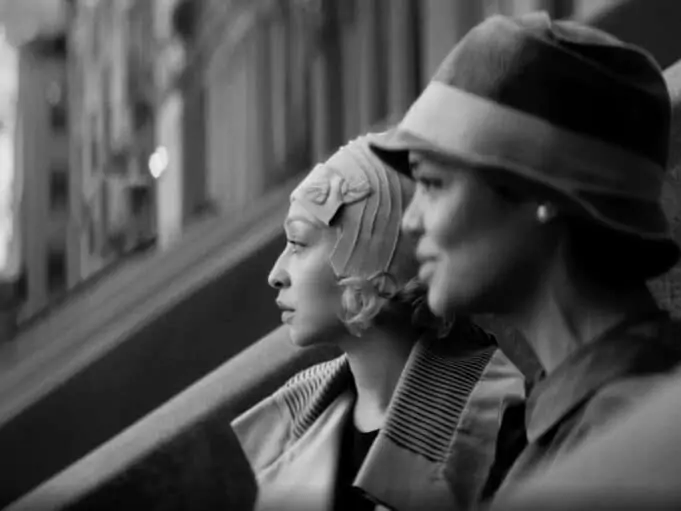Written by Rebecca Hall and Nella Larsen (based on the novel by)
Starring Tessa Thompson, Ruth Negga, André Holland
2021 | PG-13 | 1h 38min
Streaming: Netflix
English film director Rebecca Hall amassed impressive acting credits on stage and screen, beginning at age 10. She starred in films directed by Woody Allen and Ron Howard among others, before she decided to place herself at the other end of the camera.
With the film Passing, Hall makes her debut as a director. She has utilized Nella Larsen’s 1929 novel to bring attention to a fact most Americans forget — that Americans of mixed race have crossed the color line and lived as white since the 1800s.
This was more than a trend — it was an act of survival. Living while Black was disheartening and dangerous for so long that easing into the other side became a way of life for those with opportunity and lighter skin. It is said that president Thomas Jefferson helped his daughter with Sally Hemings “run,” or escape into another world up north.
Novelist Nella Larsen was born to a Danish seamstress and a West Indian cook. Director Rebecca Hall and both her stars in Passing were born in mixed race families, and so learned to appreciate both the subtle and direct ways in which people are judged by their appearance and demeanor.
Hall believes that film footage in black and while best illustrates this nuanced complexity of racial factors in 1920s Harlem, NY and even today. Utilizing soft grays, handheld cameras and some out of focus shots surrounded by memorable jazz music of the period, director Hall introduces us to a world of quiet tension underlying seemingly smooth surfaces.

Tessa Thompson as Irene and English actor Ruth Negga as Clare absolutely excel in Passing. They deliver glowing performances as they portray two successful wives in a prosperous postwar New York. Close friends in their youth, they lose touch as so many do; Irene marries a doctor and gives birth to two sons. Life is good. When she shops downtown one day, passing for white, she encounters Clare. They stare quietly across the tea room and then Clare comes
to her table.
Upstairs in the hotel room where Clare and her husband are staying, the two women talk, filling in details about the missing years. When Clare’s husband joins them, Irene is stunned. She realizes then that Clare is passing for white and her husband does not know.
We’re all of us passing for something or other.
Throughout the film, viewers have time to take in little moments where racial identity is a factor even though not spoken of directly, and the details are fascinating. How one dresses in the City, tone of voice, words not spoken, creating an impression to further an assumption — all convey what needs to be conveyed for the pose, the masquerade to be successful.
Irene leads a careful and quiet life as an affluent woman of color, endeavoring to keep the outside world away from her two children. Clare loves danger and excitement, sitting with a composed smile while her husband talks about how much he detests Negroes. Irene is both shocked and intrigued.
WATCH: Passing | Official Trailer | Netflix
How these two complex women negotiate the renewal of their friendship, and the turmoil Clare experiences when she realizes her friend’s free-styling ways may impinge on her tightly controlled world, are the substance of this absorbing film.
And throughout there is 1920s jazz and fabulous fashion to keep one’s eyes and ears in a state of delight. In an interview with Vanity Fair, director Rebecca Hall quotes the legendary photographer Gordon Parks, who said you should teach the eye to listen before it sees.
Hall has asked, is either woman free? One risks her life in passing for white. The other is “safe” but plagued by doubt and uncertainty. In a telling moment, Irene turns sharply on her white friend, a closeted male, and says “We’re all of us passing for something or other.”
See this film, a stunning directorial debut by Rebecca Hall. Currently streaming on Netflix.


